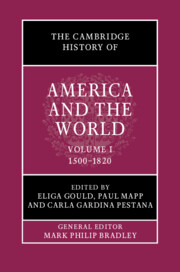Book contents
- The Cambridge History of America and the World
- The Cambridge History of America and the World
- The Cambridge History of America and the World
- Copyright page
- Contents
- Figures
- Maps
- Contributors to Volume I
- General Introduction: What is America and the World?
- Introduction: What Does America and the World “Mean” before 1825?
- Part I Geographies
- Part II People
- Part III Empires
- Part IV Circulation/Connections
- 13 West Africa, 1500–1825
- 14 The Commercial Worlds of Early America
- 15 Uncertain America: Settler Colonies, the Circulation of Ideas, and the Vexed Situation of Early American Thought
- 16 America and the Pacific: The View from the Beach
- Part V Institutions
- Part VI Revolutions
- Index
15 - Uncertain America: Settler Colonies, the Circulation of Ideas, and the Vexed Situation of Early American Thought
from Part IV - Circulation/Connections
Published online by Cambridge University Press: 12 November 2021
- The Cambridge History of America and the World
- The Cambridge History of America and the World
- The Cambridge History of America and the World
- Copyright page
- Contents
- Figures
- Maps
- Contributors to Volume I
- General Introduction: What is America and the World?
- Introduction: What Does America and the World “Mean” before 1825?
- Part I Geographies
- Part II People
- Part III Empires
- Part IV Circulation/Connections
- 13 West Africa, 1500–1825
- 14 The Commercial Worlds of Early America
- 15 Uncertain America: Settler Colonies, the Circulation of Ideas, and the Vexed Situation of Early American Thought
- 16 America and the Pacific: The View from the Beach
- Part V Institutions
- Part VI Revolutions
- Index
Summary
Uncertainty lies at the heart of early American intellectual history. Renaissance explorers and colonizers of North America sought to reconcile their monarch’s intentions, God’s will, and their own interests. The religious reformers who followed them questioned the state of their own souls and the security of their covenant with their Lord. The disputed status of truth – raised both by the New Science and the reformed emphasis on verifiable evidence of religious conversion highlighted the limits of human knowledge in colonial settings. The Indigenous people thrown into contact and conflict with European newcomers and the African born compelled to a transatlantic voyage and labor in the Americas grappled with worlds transformed and sought to define their uncertain places within them. Nor did these problems abate in the eighteenth century. The now established creole colonies wrestled with their political and social place in a consolidating British Empire. The expansion of slavery and the continuing conflicts with Indigenous groups produced new languages and understandings of race, while threatening the creole sense of equality with Europe. Enslaved Americans produced their own cultural and religious traditions while Native Americans experimented with forms of proto-nationalist thinking.
- Type
- Chapter
- Information
- The Cambridge History of America and the World , pp. 336 - 356Publisher: Cambridge University PressPrint publication year: 2022

